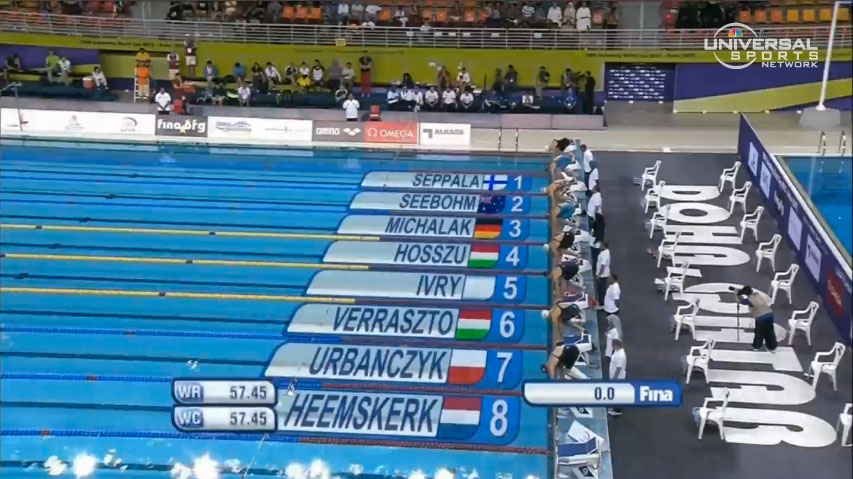The international sportswriters' association, which goes by the acronym AIPS, held its two-day executive committee meeting this week in Doha, Qatar. The meeting's guest of honor was Sheikh Saoud bin Abdulrahman Al Thani, the secretary general of the Qatar Olympic Committee, who is keenly sophisticated and moves fluidly between Arab and western cultures. The Qataris bid -- unsuccessfully -- for the Summer Games of 2016 and 2020, cut early on in each round by the International Olympic Committee. Of course, soccer's World Cup is set for Qatar in 2022.
His Excellency told the ladies and gentlemen of the press that sport is fundamentally one of the pillars of Qatar's development plan. This year, the Qataris will organize 40 major sports events. By 2020, he said, the goal is to stage a big event every week of the year.
And, of course, he said, to bid again for the Olympics. Maybe for 2024. Possibly 2028.
If you have been to Doha, actually been on the ground, you know that there is serious commitment there. The new president of the IOC, Thomas Bach, has long had extensive ties to the Middle East, so one would imagine the climate -- so to speak -- for a Gulf bid would be as good as it could ever get.
There's only one thing that could stop a Doha bid dead in its tracks, and it's not the heat. Nor is it the capacity, infrastructure or even the impact on television schedules.
It's this:
This photo offers irrefutable evidence of everything the Olympic values -- friendship, excellence, respect -- are not.
This sort of intolerance, indeed discrimination, has to stop. Now. And forever more.
This screenshot shows the start of the women's 100-meter individual medley at swimming's World Cup stop in Doha -- happening more or less about the same stretch of time His Excellency and some of the world's leading writers were meeting to talk about all the exciting things happening in the Qatari capital.
In Lane 5 is Amit Ivry of Israel.
The Israeli flag that should be depicted in the graphic display in the host broadcast feed has instead been washed out.
This incident marked just one of several episodes directed against Israeli swimmers at the World Cup stops in both Dubai (Oct. 17-18) and Doha (Oct. 20-21).
On Day 1 in Dubai, Israeli swimmers were not properly identified, either by announcers on the scoreboard. That way, their name and national flag wouldn't have to be shown, a veteran national-team swimmer, Gal Nevo, told a leading Israeli newspaper, Ha'aretz.
Things in Dubai were apparently back to normal by Day 2. Nevo, for instance, announced as from the country "I-S-R" on Day 1, was announced as from "Israel" on Day 2.
He said, "Suddenly, you arrive in a country that has refused to recognize you until now, and know that the next time we'll be here they won't play those games with us. I don't know how many television viewers we're talking about but the people in the emirate saw the Israeli flag over and over again, and were exposed to the country's sporting aspect."
That this sort of thing happened in Dubai can not have come entirely as a huge shock.
After all, this was where in 2009 the Israeli tennis player Shahar Peer was refused a visa for the Dubai Duty Free Tennis Championships; tour officials fined organizers $300,000 and said all qualified players had to be able to play or the tournament's sanctioning would be at risk. Peer has since played in Dubai.
That said, recent years have seen a veritable catalogue of incidents in which politics and sport have mixed in all the wrong ways, consistently with the Israelis as the target.
At the 2004 Athens Olympics, for instance, Iran's judo world champion, Arash Miresmaeli, refused to take to the mat for a first-round match against Israel's Ehud Vaks in the under-66 kg class. Iranian officials later awarded Miresmaeli the same $120,000 given its gold-medal winners at those 2004 Games for what was called a "great act of self-sacrifice."
At the 2008 Beijing Games, Iran's Mohammed Alirezaei refused to compete alongside Israeli swimmer Tom Be'eri in the heats of the 100 backstroke.
At the 2010 Olympic Youth Games in Singapore, in the final of the boys under-48 kg class in taekwondo, Gili Haimovitz of Israel won when Mohammed Soleimani of Iran proved a no-show, officially claiming he had aggravated an old injury to his left leg. Soleimani skipped the medals ceremony as well -- missing the Israeli flag and anthem.
In 2012, Algerian kayaker Nasreddine Baghdadi withdrew from a World Cup event in which Israeli Roei Yellin was entered, and the president of the Algerian Olympic Committee, Rachid Hanifi, said all its athletes might refuse to compete against Israelis at the London Games: "There is an obligation to ask our government if we have to meet Israel in sport."
That prompted the then-IOC president, Jacques Rogge, to declare that only serious injury would be accepted as an excuse for not competing at the London Games, that suspicious withdrawals would be checked by an "independent medical board" and that bogus withdrawals would lead to unspecified sanctions.
Just two weeks ago, Tunisia's tennis federation ordered its top player, Malek Jaziri, ranked 169th in the world, not to play Israel's Amir Weintraub in the quarterfinals of a lower-tier ATP event in Tashkent, Uzbekistan.
International Tennis Federation spokesman Nick Imison told Associated Press he believed the case was a first-of-its-kind in tennis.
The constitution of swimming's international federation, which goes by the acronym FINA, is absolutely clear that discrimination on the grounds of "race, sex, religion or political affiliations" is out of bounds.
True, FINA officials absolutely had been put on notice by events in Dubai. But Doha? This was where a 20-year-old Shahar Peer in 2008 -- the year before the episode in Dubai -- had reached the round--of-16. Moreover, her first night in the city, the tourney director had even taken her and her entourage out to dinner at a Moroccan restaurant in the traditional Souk district marketplace.
And yet -- Doha.
According to a report in the Times of Israel, it's not just that the Israeli flag was not displayed in the computer graphics of the races. Some races in which Israelis swam were not broadcast. The Israeli flag was removed from outside the venue; a tweet was posted Sunday complaining about the flag's presence before it was taken down from outside the swim complex, according to the Doha News.
How this all happened remains entirely unclear. Who precisely was responsible -- also uncertain.
FINA on Wednesday issued a statement saying that it reacted to events in both Dubai and Doha as soon as it knew. In Doha, for instance, FINA officials say they were told the full scope of what had happened only 15 minutes before the end of Day 2.
The statement says FINA "guarantees" that "all steps will be taken in the future for such acts not to occur again."
This is particularly key because the world short-course championships are due to be held in Doha Dec. 3-7, 2014. Dubai and Doha are also scheduled to host further World Cup events ahead of the worlds.
FINA's executive director, Cornel Marculescu, told Associated Press the two organizing committees apologized for what he called these "stupid things." He also said, "Next year we have the world championships and these things will not happen anymore."
Marculescu is absolutely right to label the incidents so forthrightly and to say enough is enough.
Now: Doha has a huge incentive to bid for the Olympics.
There are all kinds of bold steps that could be taken. For instance, there are apologies of all sorts. Some are private. Some are meant to be much more public.
Or: there are ways of reaching out, gestures of goodwill -- say, swim clinics in which regional stars teach local kids. Could it hurt to invite Amit Ivry, winner of the silver medal in the 100 medley at the Doha 2013 World Cup?
At the least -- all the Israelis all ought to be taken out to dinner next December at the worlds, everyone ought to shake hands and pose for some tourist-like pictures in the Souk and then all hands can get on with the business of swimming.
The Israelis -- just like they were anybody else. That's what they, and everybody, deserve.
After all, that's the fundamental promise inherent in Olympic sport -- that everyone can get along and that everyone deserves a chance to do their best, however good-enough that best might be. If the Qataris want to invite the world in 2024 or 2028 and be taken dead seriously about it -- an Olympics is way different than the World Cup -- that is the deal. Anything less is a non-starter.





